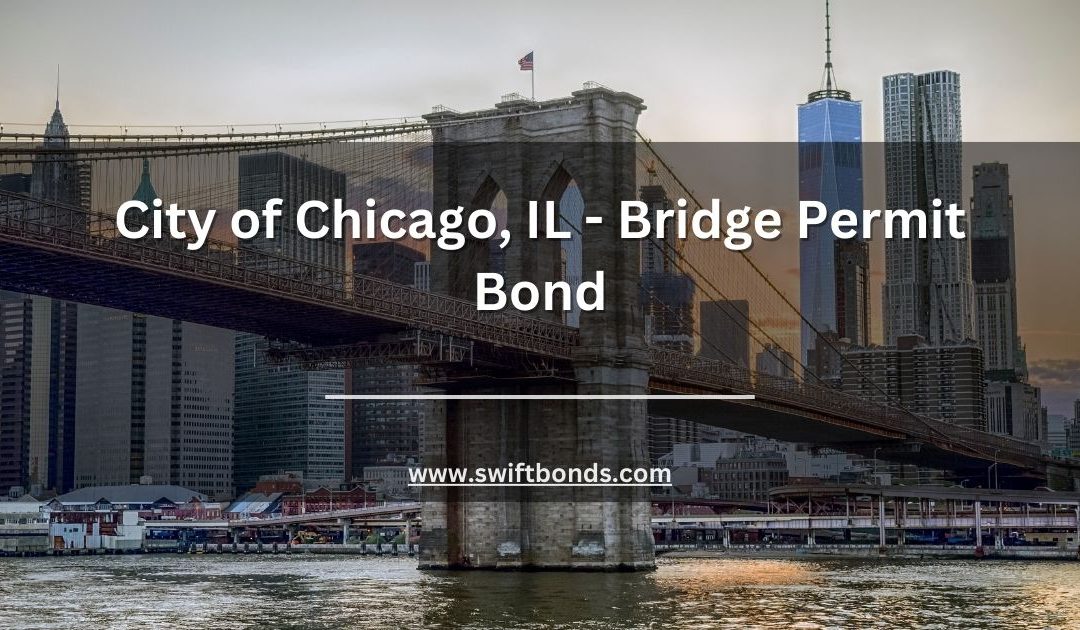Get an Instant Quote on Bridge Permit Bond

Introduction
From our perspective, contractors working on bridges in Chicago, IL must secure a Bridge Permit Bond to meet city requirements. Like the Local Unions Nos. 21 and 52 - Employer's Wage and Welfare Bond and the City of Countryside, IL - Contractor ($20,000) Bond, this bond ensures compliance with local laws, safety standards, and structural integrity regulations when constructing, repairing, or modifying bridges within the city.
The City of Chicago, IL - Bridge Permit Bond serves as a financial safeguard, protecting the city and the public from potential damages caused by a contractor’s work. Without it, obtaining a permit for bridge-related projects is not possible.
Common Misunderstandings About This Bond
We’ve noticed that some contractors assume this bond functions like insurance. In reality, it does not provide financial protection for the contractor. Instead, it guarantees that the contractor will fulfill all obligations under the permit.
Another misconception is that once the bond is obtained, it eliminates liability. If a contractor violates permit conditions, causing damage or failing to complete the project properly, the city can file a claim against the bond. The contractor is then responsible for reimbursing the surety company for any paid claims.
Failure to secure this bond can lead to project delays, permit denials, or legal penalties.

Advantages of Securing This Bond
Based on our experience, this bond provides several benefits to contractors and project owners alike:
- Regulatory compliance – Meeting the city's bonding requirement allows contractors to obtain the necessary permits.
- Public safety assurance – Ensures that work meets local standards, reducing risks of structural failures.
- Financial accountability – Protects the city from financial loss in case of contractor violations.
Contractors who obtain this bond demonstrate professionalism and commitment to high-quality work.

How to Get the Bond
What we’ve discovered is that obtaining the City of Chicago, IL - Bridge Permit Bond involves a few key steps:
- Confirm city requirements – Check the exact bond amount and conditions with Chicago officials.
- Select a surety provider – Choose a company that specializes in construction-related bonds.
- Submit an application – Provide relevant business and financial details.
- Get a quote – The cost of the bond depends on credit history and financial standing.
- Purchase the bond – Submit it along with the bridge permit application.

Consequences of Not Having This Bond
In our observation, failing to secure this bond can lead to serious setbacks for contractors.
Potential Risks Without the Bond
Contractors who do not obtain the City of Chicago, IL - Bridge Permit Bond may face:
- Permit denials, preventing them from working on bridge projects.
- Fines and legal penalties for non-compliance with city bonding regulations.
- Project delays due to incomplete permit applications.
Not securing the bond can create significant financial and operational challenges.

Long-Term Benefits of This Bond
We’ve learned that contractors who prioritize obtaining this bond experience smoother permitting processes, fewer legal complications, and a stronger professional reputation.
Conclusion
Contractors working on bridges in Chicago, IL must obtain the City of Chicago, IL - Bridge Permit Bond to secure necessary permits. This bond ensures compliance with city regulations, enhances contractor credibility, and protects public safety.
Securing this bond before applying for a permit allows contractors to avoid delays, legal complications, and financial penalties.
Frequently Asked Questions
What does this bond cover?
It guarantees that contractors follow city regulations, meet safety standards, and complete permitted bridge work as required.
How much does this bond cost?
Pricing varies based on the contractor’s credit score, financial stability, and experience.
How long does this bond remain valid?
Most bonds last for one year and must be renewed for continued compliance.

